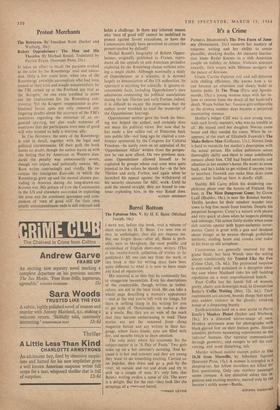Protest Merchants
IT takes an effort to recall the passions evoked at the time by the Rosenbergs' trial and execu- tion. Only a few years later, when two of the Rosenbergs' erstwhile accomplices who had been named at their trial and sought unsuccessfully by the FBI turned up at the Portland spy trial as the `Krogers,' no one even troubled to point out the implications for the Rosenberg con- troversy. Yet the Krogers' reappearance as pro- fessional Soviet spies not only removed any lingering doubts about the accuracy of the FBI's assertions regarding the existence of an or- ganised spy-ring, but also made nonsense of assertions that the participants were men of good will who wanted to help a wartime ally.
In The Betrayers, the story of the Rosenbergs is told in detail, together with the legal and political circumstances. Of their guilt the book leaves no doubt, though the author leaves us with the feeling that by American or Western stan- dards the penalty was unnecessarily severe, though not unjust, and politically unwise. Mr. Root writes convincingly and vividly. He re- creates the immigrant East-side in which the Rosenbergs grew up and the mental climate pre- vailing in America during the long-drawn-out Korean war. His picture of how the Communists in the US and elsewhere succeeded in exploiting the issue and the combined ignorance and com- passion of 'men of good will' for their own utterly uncompassionate ends is still relevant and holds a challenge. Is there any inherent reason Why 'men of good will' cannot be mobilised to protest against Soviet executions, or have the Communists simply been permitted to corner the protest-market by default?
Michel Rouzd's biography of Robert Oppen- heimer, originally published in France, repro- duces all the appeals to anti-American prejudice exploited by the Rosenberg claque without miss- ing a single cliché. Although nominally a study of Oppenheimer as a scientist, it is devoted largely to denunciation of the US authorities. Its approach is anything but scientific. It ignores in- contestable facts, including Oppenheimer's own admissions concerning his political associations during the late Thirties and early Forties; indeed, it is difficult to escape the impression that the author never troubled to read the transcript of the Oppenheimer hearings.
Oppenheimer neither gave the book his bless- ing nor helped the author, and certainly does not share his political, views. But now that he has made a few sallies out of Princeton back into public life—not long ago he chaired a con- ference sponsored by the Congress for Cultural Freedom—he surely owes us an appraisal of the `Oppenheimer Affair' written from the perspec- tive he can now afford. On two previous occa- sions Oppenheimer allowed himself to be exploited by groups whose real aims were quite inimical to the values he stands for—in the late Thirties and early Forties, and again when he launched his appeal against the withdrawal of his security clearance for AEC work. Until he puts the record straight, they ,are bound to con- tinue exploiting him, in the way Rouze does.
ALFRED SHERMAN


































 Previous page
Previous page